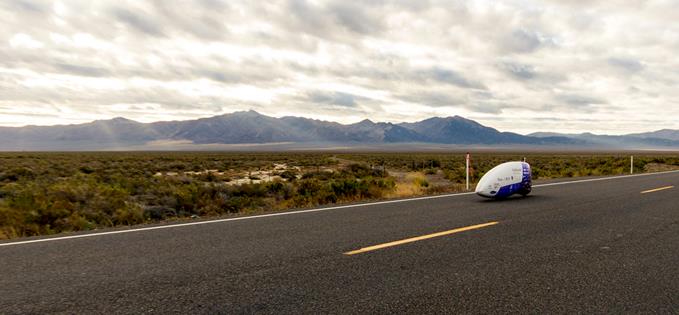A team of engineering students from the University of Liverpool have set a new British land speed record, with a revolutionary bike they developed in the city hitting more than 75 mph.
They broke the human powered British Land Speed Record three times while competing against an international field in Battle Mountain, Nevada.
Their hopes of breaking the world speed record were dashed, missing out by just a few miles an hour, but the Liverpool team vowed to be back to have another go next year.
The University of Liverpool Velocipede Team designed and built their recumbent bicycle, ARION1, from scratch and, sponsored by Rathbones Investment Management, transported and raced the finished product at the World Human Powered Speed Challenge 2015 held in the Nevada desert.
Aiming for the world record of 83.13mph, set at the same venue by a Dutch team in 2013, the Liverpoo team just fell short but were able to surpass the British record of 67.4mph, set by Rob English at Battle Mountain in 2002.
The male riders successfully qualified, but female rider Natasha Morrison was unable to hit the speeds required to qualify for the main event.
 Like no bike you have seen
Like no bike you have seenMixed weather conditions then forced the abandonment of runs early in the week. But with the sun back out, the ULV Team clocked up a 69.7mph run by rider, Ken Buckley to take the British Land Speed Record.
On the final day, fellow rider, David Collins, a PhD student at the University, hit back with 70.6 MPH only for that speed to be topped by Ken pushing all the way to a new British Land Speed Record of 75.03mph.
Patrick Harper, deputy team leader, said: “Damage sustained to the exterior shell and steering after a high speed impact meant working through the night on Thursday and Friday to make it possible for our riders to attempt breaking records again.
“On the final evening of the race week the bicycle was in great condition, the riders were pumped and the weather provided perfect racing conditions.
“David and Ken were able to hit incredible speeds – the team were ecstatic."
The competition, organised by the International Human Powered Vehicle Association, takes place on a regular road that is closed for just 20 minutes morning and evening each day. The riders accelerate over a five mile course, before reaching a 200m flat section where the speeds are measured and recorded. Both David and Ken were presented with commemorative speeding tickets by the Nevada sheriff for breaking the road’s 70mph speed limit.
Senior lecturer in the School of Engineering, Dr Tim Short, accompanied the team to Nevada. He said: “To break the British record three times in our first ever attempt at this challenge is an outstanding achievement for the whole ULV Team.
"The world record was topped by a Canadian team competing at the same event. Todd Reichert and his AeroVelo team achieved a speed of 86.65mph. With the design of ARION2 already under way this will be the target for the ULV Team at next year’s event.










